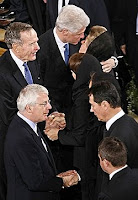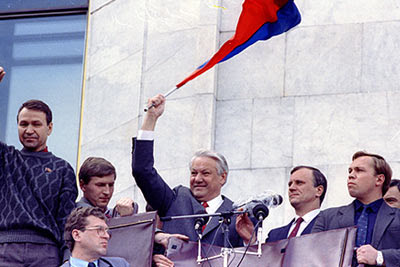The Lone, but Undefeated Soldier
 The European edition of the Wall Street Journal today came out with an opinion article boasting the editorial's love for facts and historical as well as cultural research. Usually, I would blame such articles on the general political direction of a newspaper, but I could not find such support here. The background of the story was covered in an earlier post and relates to the Russian and Estonian dispute over the location of a memorial dedicated to the memory of Red Army soldiers who freed Estonia from Nazi occupation. The WSJ writes:
The European edition of the Wall Street Journal today came out with an opinion article boasting the editorial's love for facts and historical as well as cultural research. Usually, I would blame such articles on the general political direction of a newspaper, but I could not find such support here. The background of the story was covered in an earlier post and relates to the Russian and Estonian dispute over the location of a memorial dedicated to the memory of Red Army soldiers who freed Estonia from Nazi occupation. The WSJ writes:
The Estonian government transferred the bronze statue of a Red Army soldier and exhumed remains of Soviet troops to a military cemetery near the capital. Estonians are generous to keep them at all. The Soviets annexed their country in 1940 and only let go 51 years later. France doesn't have a memorial to the Nazi occupation.Indeed, France does not celebrate Nazi occupation. But is it a paradox that some Estonian citizens do; not without governmental support? On May 8, 2005, right before the May 9th Victory Day in Russia, and on VE day celebrated by the majority of EU members and the United States, Estonia unveiled a monument to the Wehrmacht soldiers and the 20th SS division who fought for the "freedom" of Estonia. The memorial was unveiled near a Memorial Complex to Soviet soldiers.
Just over a year later, on June 29, 2006, the North-Eastern Estonian city of Sinimae saw the erection of another monument dedicated to veterans of the Estonian (and Baltic) SS divisions. Despite protests by Russia's Jewish Community Federation to the European Union, Estonia saw no real sanctioning or serious warnings with regard to its actions. To top off the history of memorials commemorating SS members (note that there is a stark difference between being a regular Wehrmacht soldier and an SS division member), on numerous occasions Russian authorities have notified the European Union regarding annual marches of Estonian SS veterans celebrating the Nazi movement in the capital Tallinn.
Many historians would argue that Estonian nationals joined the Wehrmacht and SS divisions to free their country from Bloshevism and create an independent Baltic republic or Baltic states under the protectorate of Nazi Germany. Yet, looking through the Resettlement plans developed by Nazi Party officials before their Eastern campaign, the fate of the Baltic states, including Estonia, was to be incomparably worse than that which the Red Army brought along. Two thirds of the population were to be deported, while the remaining were to be exterminated within ten years. There are numerous document on the issue, but I cite the work of two Polish historians on the resettlement issue to clear myself of a bias toward a Russian interpretation of World War II events:
The Plan stipulated that there were to be different methods of treating particular nations and even particular groups within them. Attempts were even made to establish the basic criteria to be used in determining whether a given group lent itself to Germanization. <...>The Plan considered that there were a large number of such elements among the Baltic nations. Dr. Wetzel (author of Nazi resettlement plan - RTTT note) felt that thought should be given to a possible Germanization of the whole of the Estonian nation and a sizable proportion of the Latvians. Himmler's view was that almost the whole of the Lithuanian nation would have to be deported to the East. Whatever happened, Lithuania, Latvia and Estonia were to be deprived of their statehood, while their territories were to be included in the eastern area of German settlement. This meant that Latvia and especially Lithuania would be covered by the deportation plans, though in a somewhat milder form than the Slav - "voluntary" emigration to western Siberia.Denial and revision of history in most cases leads to the development of ultra-nationalistic tendencies in society; the Germans have, to the great tragedy of the world, learned this in 1945. In a way, revisionism and denial of history took its toll on the Soviet Union. As I stipulated previously, it is up to Estonia to revise its own history, and erect, displace, and ultimately destroy monuments to anyone it wants. But its behavior must be noted by the European Union, in particular Germany, holding the EU presidency. The fact that Estonian shows of revisionism occur right around the Victory Day celebrations in Russia show the deliberation the Estonian government is showing in trying to mock Russia and its history.
Even if the small Bronze soldier monument will some day disappear, the story of the millions who gave their life to the altar of Nazi defeat will be remembered honorably by the majority of the World's citizens.











































